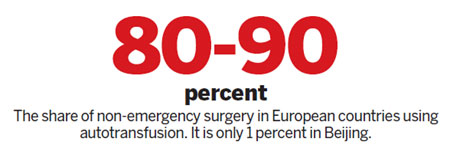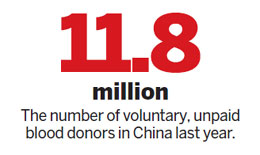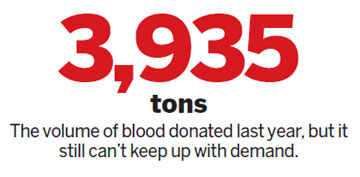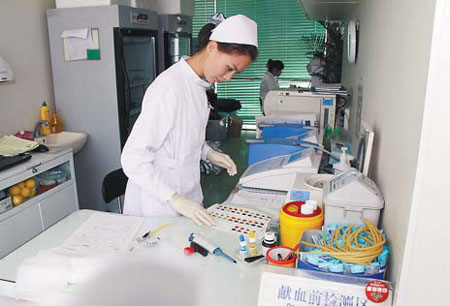Patients may be their own best blood donors
Updated: 2011-12-27 08:17
By Yang Wanli and He Na in Beijing, and Tang Yue in Tianjin (China Daily)
|
|||||||||
|
A nurse checks blood samples at a Beijing blood donation center. [Zhu Xingxin / China Daily] |
Some obstacles
Autotransfusion, which is used in a number of orthopedic, trauma and cardiac cases, is recommended in many cities. Tianjin's health department requires that it be used in at least 10 percent of surgeries that might call for extra blood, although the regulation has not been fully implemented.
For non-urgent surgery that is expected to require about 400 to 600 ml of replacement blood, doctors can take blood from the patient a week before surgery. The method seems to be a perfect option. However, Bai said there are high standards for blood storage that many small and mid-size hospitals cannot meet.
He also said only a limited number of hospitals in Beijing have the autotransfusion equipment. A device known as a "cell saver" is used in surgeries - such as those for aneurysms, total joint replacements and spinal operations - with the potential for heavy blood loss. The machine suctions blood that is lost, filters it and returns it to the patient's body.
It is valuable, and expensive for patients. While Bai said a "cell saver" costs about 11,000 yuan ($1,740) to buy, the patient is charged 1,100 to 1,900 yuan ($174-$300) for its use. A unit of donor blood costs 230 yuan ($36).
"Some patients are worried about the price, but more people don't choose it because of a lack of knowledge," Bai said.
"I haven't heard of autotransfusion before. In my mind the only way to have blood transfusion is to buy others' blood in the hospital," said Li Yongliang, 29, a budgeting specialist for a Beijing real estate company.
"My wife's due date is in July next year. I will be worried to death if the doctor withdraws blood from her several days before my kid's birth. So no matter how many advantages autotransfusion has, I won't take it this time.
"The patient is already very weak if he needs an operation," Li said. "Can his body afford a blood withdrawal? I quite doubt it."
Bai said doctors would recommend autotransfusion only when it's suitable for the patient. And a pregnant woman could be given saline, with no discomfort, to replace the volume of blood lost to self-donation. "The procedure is very useful, especially to people with rare blood types," he said.
Other difficulties
If they aren't worried about the procedure itself, some people express their concern about improper conduct without a detailed law on autotransfusion. In China, all donor blood comes from blood centers, but autotransfusion is conducted in the hospital.
"I don't trust such pre-storing. If I store my blood two weeks before surgery and there is an emergency need for my type, maybe my blood will be used," said a man whose blood is Rh-negative.
"So far there is no regulation to control hospital abuse of stored blood," said Kong Xin, director of the blood bank at a well-known hospital in Northeast China's Jilin province. "If a hospital encourages patients to use autotransfusion, it is hard for the health department to control the blood market."
Kong said her hospital doesn't use autotransfusion now but the hospital director has put it on the agenda. She doesn't think the technique will find much favor among the staff.
"As doctors we all know the advantages of autotransfusion," she said. "But autotransfusion is not included in the medical staff's performance review and it will not put an extra penny in your pocket, so who will bother to promote it?"
Write to the reporters at yangwanli@chinadaily.com.cn, hena@chinadaily.com.cn and tangyue@chinadaily.com.cn.
















